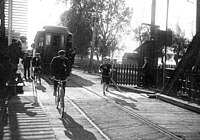James Duffy
|
James Duffy |
|
| nation |
|
| birthday | May 1, 1890 |
| place of birth | Sligo , Ireland |
| size | 172 cm |
| job | Stonemason |
| date of death | April 23, 1915 |
| Place of death | Ypres , Belgium |
| Career | |
|---|---|
| discipline | Long distance running |
| Best performance | Marathon: 2:25:01 h |
James "Jimmy" Duffy (* 1. May 1890 in Sligo ( County Sligo ), Ireland ; † 23. April 1915 at Ypres ( West Flanders ), Belgium ) was a Canadian athlete , who the world's best marathon runners at the beginning of the 20th century counted . Duffy's greatest sporting successes were participating in the 1912 Summer Olympics in Stockholm and winning the Boston Marathon in 1914 .
As a child, James Duffy moved the family to Edinburgh , where he grew up. Only for personal enjoyment did he occasionally take part in cross-country races, which he could easily win. In 1911 he left Scotland and emigrated to Canada, where he settled in Toronto . He found work as a tinsmith and stonemason .
In his spare time, he attended the local YMCA , the director of which immediately recognized Duffy's running talent. In 1911, wearing the YMCA jersey, he was sent to the largest running event in Toronto at the time, the Ward Marathon , a 20- mile (32 km) run. Lying in the lead, he stopped on the way and discussed with helpers from another runner who felt handicapped. He forgave the victory and only crossed the finish line in second. This incident perfectly reflects the character of Duffy, for whom it was not success that was important, but pleasure. So he did not attach great importance to training discipline in the future either, but found a cigarette and a beer before and after the competition to be indispensable.
In the meantime, Duffy had joined the Eaton Athletic Club in Toronto, for which he took part in the Spectator Marathon in Hamilton in May 1912 . The run was used to name the Canadian long-distance runners for the 1912 Summer Olympics and was therefore shortened to 19 miles (30.4 km). After a cold spring, the weather was hot for the first time on the running day. Of the 25 starters, only 8 finished. Duffy, too, had overestimated his strength and was overtaken by a US runner on the last mile , but qualified second for the Olympic Games.
The marathon at the 1912 Summer Olympics was also characterized by very high temperatures that ultimately even cost a runner, Francisco Lázaro , his life. Duffy started the run slowly, until halfway he was still far behind. After 26 km he had already fought his way up to 16th place. More and more runners fell behind or gave up, finally Duffy was even 5 km from the finish in 5th place, which he was able to defend until the finish.
In October 1912, Duffy first participated again in the Ward Marathon , which he won this time, and shortly afterwards in the Around the Bay Road Race in Hamilton, the oldest regularly held road race in North America . He also won here and even set a new course record. His coach, who lives in Hamilton, then persuaded him to move from Toronto to Hamilton, which he did. Duffy became a member of the Ramblers Club of Hamilton and began some serious training. It was followed by victory after victory, including the 1913 Yonkers Marathon and again the Around the Bay Road Race.
On April 19, 1914, Duffy started the Boston Marathon . The word of his successes had got around and Duffy's role as favorite was so great that the bookmakers were unwilling to place high stakes on Duffy's victory. The run turned into a thriller, as Duffy's compatriot, Édouard Fabre , stayed on Duffy's heels, who set the pace from the start. Only on the last kilometer did Duffy run out a small lead, which meant victory by 15 seconds, which is one of the smallest distances between a winner and runner-up at the Boston Marathon to this day.
Duffy was henceforth a respected man in sports circles. Many contemporaries were amazed that he wanted to continue his sports career as a professional runner . In June 1914, Duffy and his opponent from the Boston Marathon, Édouard Fabre, organized a five-mile run on an 800-meter racecourse in Kingston . This time Fabre won by almost 300 meters.
With the outbreak of World War I, Duffy enlisted as a soldier for the Canadian Army . In September 1914 he was part of the first Canadian troops to be sent to Europe. Initially stationed in England , he was sent to the front in Belgium in the spring of 1915 . James Duffy fell in the Second Battle of Flanders on April 23, 1915, just 8 days before his 25th birthday and 4 days after his toughest rival, Édouard Fabre, won the 1915 Boston Marathon.
Web links
- Biography ( Memento from January 31, 2009 in the Internet Archive )
- James Duffy in the Sports-Reference database (English; archived from the original )
| personal data | |
|---|---|
| SURNAME | Duffy, James |
| ALTERNATIVE NAMES | Duffy, Jimmy |
| BRIEF DESCRIPTION | Canadian athlete |
| DATE OF BIRTH | May 1, 1890 |
| PLACE OF BIRTH | Sligo , Ireland |
| DATE OF DEATH | April 23, 1915 |
| Place of death | near Ypres , West Flanders , Belgium |
